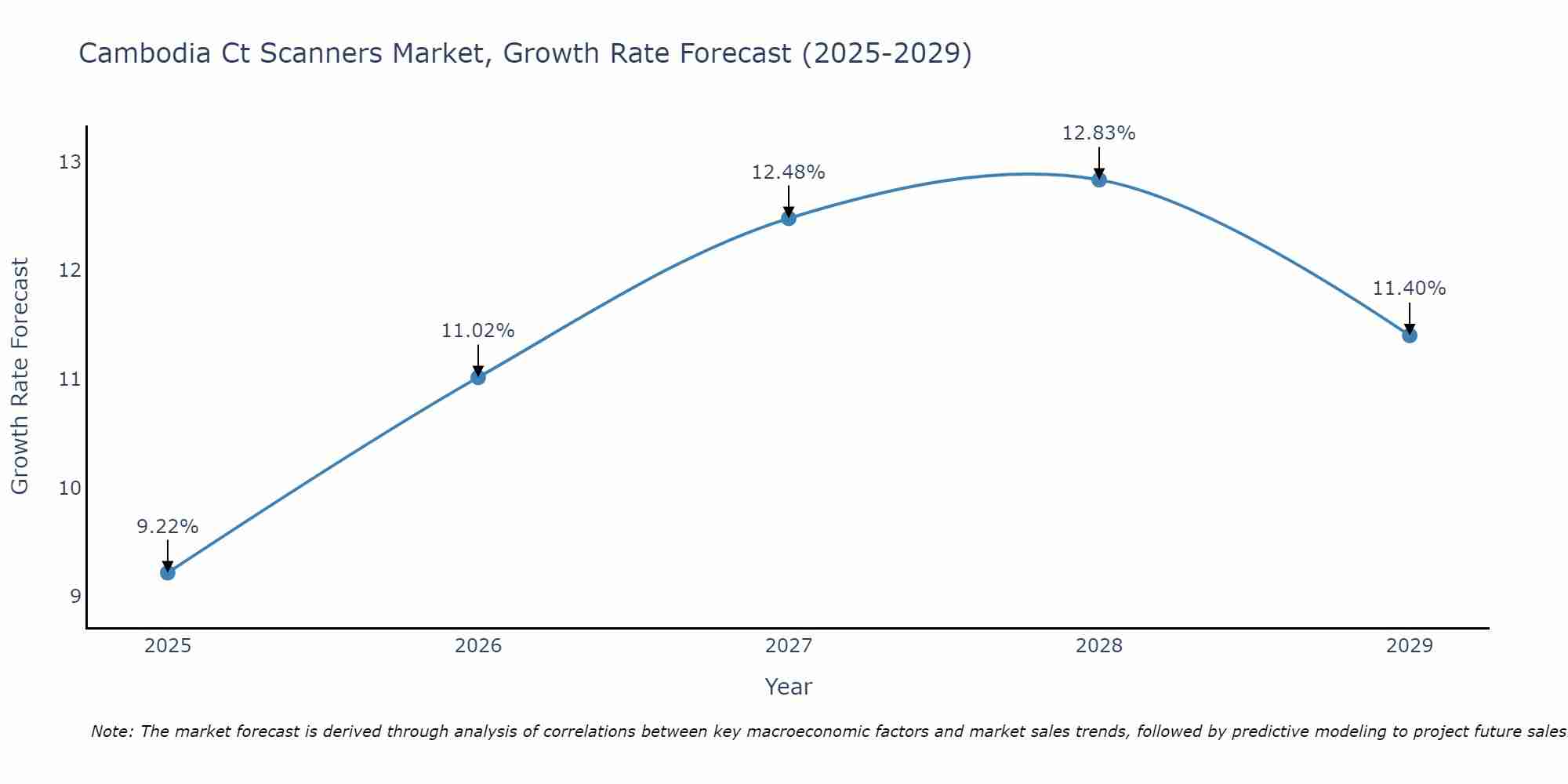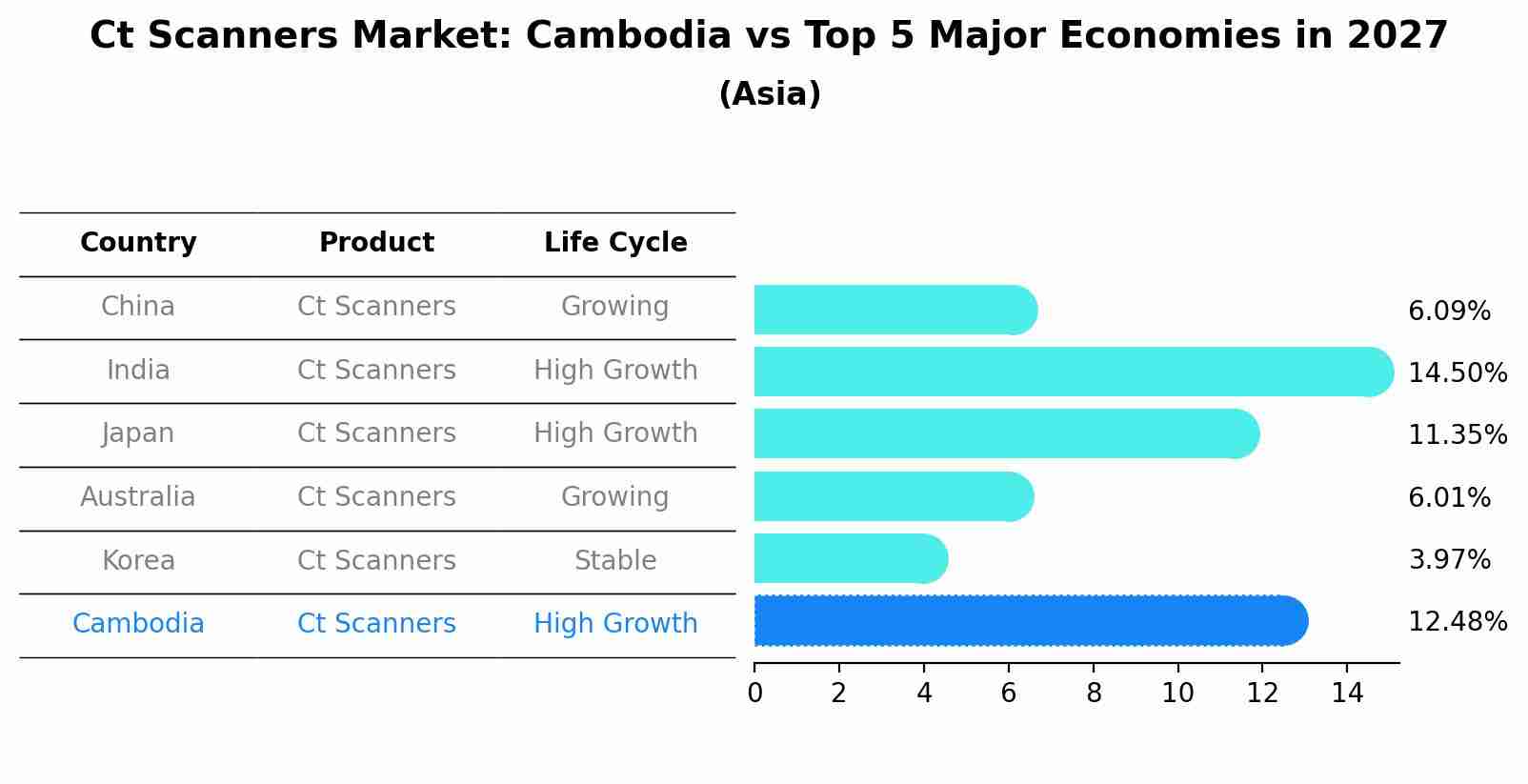Cambodia Ct Scanners Market (2025-2031) Outlook | Growth, Size, Revenue, Analysis, Forecast, Companies, Value, Share, Industry & Trends
| Product Code: ETC362793 | Publication Date: Aug 2022 | Updated Date: Aug 2025 | Product Type: Market Research Report | |
| Publisher: 6Wresearch | Author: Bhawna Singh | No. of Pages: 75 | No. of Figures: 35 | No. of Tables: 20 |
Cambodia Ct Scanners Market Size Growth Rate
The Cambodia Ct Scanners Market is projected to witness mixed growth rate patterns during 2025 to 2029. Starting at 9.22% in 2025, the market peaks at 12.83% in 2028, and settles at 11.40% by 2029.

Ct Scanners Market: Cambodia vs Top 5 Major Economies in 2027 (Asia)
Cambodia's Ct Scanners market is anticipated to experience a high growth rate of 12.48% by 2027, reflecting trends observed in the largest economy China, followed by India, Japan, Australia and South Korea.

Cambodia Ct Scanners Market Synopsis
The Cambodia CT scanners market is experiencing steady growth driven by increasing investments in healthcare infrastructure and rising demand for advanced medical imaging technologies. The market is characterized by the presence of key players such as GE Healthcare, Siemens Healthineers, and Philips Healthcare, who offer a range of CT scanner products catering to various healthcare settings. The adoption of CT scanners is on the rise in Cambodia due to the growing prevalence of chronic diseases and the need for accurate diagnostic tools. Government initiatives to improve healthcare services and the expansion of private healthcare facilities further contribute to the market growth. However, challenges such as limited access to advanced medical technologies in rural areas and the high cost of CT scanners remain barriers to widespread adoption in the country.
Cambodia Ct Scanners Market Trends
The Cambodia CT scanners market is experiencing growth driven by factors such as increasing healthcare infrastructure development, rising prevalence of chronic diseases, and growing demand for advanced diagnostic imaging technologies. There is a notable shift towards the adoption of more advanced CT scanner models with higher image quality, faster scanning speeds, and lower radiation doses. Key players in the market are focusing on product innovations, such as the introduction of portable and mobile CT scanners, to cater to the increasing demand for point-of-care diagnostics. Additionally, the market is witnessing a trend towards partnerships and collaborations between healthcare providers and technology companies to enhance access to CT scanning services in remote areas. Overall, the Cambodia CT scanners market is poised for further expansion as the healthcare sector continues to evolve and modernize.
Cambodia Ct Scanners Market Challenges
In the Cambodia CT scanners market, some key challenges include limited healthcare infrastructure and resources, leading to unequal access to advanced medical imaging technologies, including CT scanners. Additionally, there is a shortage of skilled healthcare professionals, such as radiologists and technicians, who are essential for proper utilization and maintenance of CT scanners. The high initial cost and ongoing expenses associated with CT scanners present a financial barrier for many healthcare facilities in Cambodia. Moreover, regulatory and licensing requirements may pose challenges for importing and operating CT scanners in compliance with local laws and standards. Overall, addressing these challenges will be crucial in expanding access to CT scanners and improving diagnostic capabilities in the Cambodian healthcare system.
Cambodia Ct Scanners Market Investment Opportunities
The Cambodia CT scanners market presents promising investment opportunities due to the country`s increasing healthcare infrastructure development and rising demand for advanced medical equipment. With a growing awareness among the population about the importance of early disease detection and diagnosis, the demand for CT scanners is expected to rise significantly. Investing in the distribution and servicing of CT scanners in Cambodia could prove to be lucrative, especially with the government`s focus on improving healthcare services. Additionally, partnerships with local hospitals and clinics to provide access to advanced medical imaging technology could be a strategic investment approach in this emerging market. Overall, the Cambodia CT scanners market offers potential for growth and expansion for investors looking to capitalize on the country`s evolving healthcare landscape.
Jordan Agar Market Government Policies
The government of Cambodia has implemented policies to regulate the import and use of CT scanners in the country. These policies include requirements for registration and licensing of medical devices, quality control standards, and guidelines for the safe operation of CT scanners in healthcare facilities. Additionally, the government has been focusing on increasing access to healthcare services, which is expected to drive the demand for CT scanners in the country. However, challenges such as limited infrastructure and resources in rural areas may impact the market growth. The government is also working on improving healthcare infrastructure to enhance the delivery of medical services, which could further boost the demand for CT scanners in Cambodia.
Cambodia Ct Scanners Market Future Outlook
The Cambodia CT scanners market is expected to witness steady growth in the coming years, driven by an increasing demand for advanced medical imaging technology, rising healthcare expenditure, and improving healthcare infrastructure in the country. The market is likely to benefit from the growing prevalence of chronic diseases, which require accurate and timely diagnosis for effective treatment. Moreover, the government`s initiatives to enhance access to quality healthcare services and the growing awareness among healthcare providers about the benefits of CT scanning are also anticipated to fuel market growth. However, challenges such as high initial costs and limited skilled professionals may hinder the market expansion to some extent. Overall, with the continuous technological advancements and increasing investments in healthcare, the Cambodia CT scanners market is poised for promising growth prospects in the foreseeable future.
Key Highlights of the Report:
- Cambodia Ct Scanners Market Outlook
- Market Size of Cambodia Ct Scanners Market, 2024
- Forecast of Cambodia Ct Scanners Market, 2031
- Historical Data and Forecast of Cambodia Ct Scanners Revenues & Volume for the Period 2021 - 2031
- Cambodia Ct Scanners Market Trend Evolution
- Cambodia Ct Scanners Market Drivers and Challenges
- Cambodia Ct Scanners Price Trends
- Cambodia Ct Scanners Porter's Five Forces
- Cambodia Ct Scanners Industry Life Cycle
- Historical Data and Forecast of Cambodia Ct Scanners Market Revenues & Volume By Type for the Period 2021 - 2031
- Historical Data and Forecast of Cambodia Ct Scanners Market Revenues & Volume By Stationary CT scanners for the Period 2021 - 2031
- Historical Data and Forecast of Cambodia Ct Scanners Market Revenues & Volume By Portable CT scanners for the Period 2021 - 2031
- Historical Data and Forecast of Cambodia Ct Scanners Market Revenues & Volume By Device Architecture for the Period 2021 - 2031
- Historical Data and Forecast of Cambodia Ct Scanners Market Revenues & Volume By C-arm CT Scanners for the Period 2021 - 2031
- Historical Data and Forecast of Cambodia Ct Scanners Market Revenues & Volume By O-arm CT Scanners for the Period 2021 - 2031
- Historical Data and Forecast of Cambodia Ct Scanners Market Revenues & Volume By Technology for the Period 2021 - 2031
- Historical Data and Forecast of Cambodia Ct Scanners Market Revenues & Volume By High-slice CT for the Period 2021 - 2031
- Historical Data and Forecast of Cambodia Ct Scanners Market Revenues & Volume By Mid-slice CT for the Period 2021 - 2031
- Historical Data and Forecast of Cambodia Ct Scanners Market Revenues & Volume By Low-slice CT for the Period 2021 - 2031
- Historical Data and Forecast of Cambodia Ct Scanners Market Revenues & Volume By Cone-beam CT for the Period 2021 - 2031
- Historical Data and Forecast of Cambodia Ct Scanners Market Revenues & Volume By Application for the Period 2021 - 2031
- Historical Data and Forecast of Cambodia Ct Scanners Market Revenues & Volume By Human Application for the Period 2021 - 2031
- Historical Data and Forecast of Cambodia Ct Scanners Market Revenues & Volume By Diagnostic Applications for the Period 2021 - 2031
- Historical Data and Forecast of Cambodia Ct Scanners Market Revenues & Volume By Cardiology Applications for the Period 2021 - 2031
- Historical Data and Forecast of Cambodia Ct Scanners Market Revenues & Volume By Oncology Applications for the Period 2021 - 2031
- Historical Data and Forecast of Cambodia Ct Scanners Market Revenues & Volume By Neurology Applications for the Period 2021 - 2031
- Historical Data and Forecast of Cambodia Ct Scanners Market Revenues & Volume By Intraoperative Applications for the Period 2021 - 2031
- Historical Data and Forecast of Cambodia Ct Scanners Market Revenues & Volume By Veterinary Application for the Period 2021 - 2031
- Historical Data and Forecast of Cambodia Ct Scanners Market Revenues & Volume By Research Application for the Period 2021 - 2031
- Cambodia Ct Scanners Import Export Trade Statistics
- Market Opportunity Assessment By Type
- Market Opportunity Assessment By Device Architecture
- Market Opportunity Assessment By Technology
- Market Opportunity Assessment By Application
- Cambodia Ct Scanners Top Companies Market Share
- Cambodia Ct Scanners Competitive Benchmarking By Technical and Operational Parameters
- Cambodia Ct Scanners Company Profiles
- Cambodia Ct Scanners Key Strategic Recommendations
Frequently Asked Questions About the Market Study (FAQs):
- Single User License$ 1,995
- Department License$ 2,400
- Site License$ 3,120
- Global License$ 3,795
Search
Thought Leadership and Analyst Meet
Our Clients
Related Reports
- Canada Oil and Gas Market (2026-2032) | Share, Segmentation, Value, Industry, Trends, Forecast, Analysis, Size & Revenue, Growth, Competitive Landscape, Outlook, Companies
- Germany Breakfast Food Market (2026-2032) | Industry, Share, Growth, Size, Companies, Value, Analysis, Revenue, Trends, Forecast & Outlook
- Australia Briquette Market (2025-2031) | Growth, Size, Revenue, Forecast, Analysis, Trends, Value, Share, Industry & Companies
- Vietnam System Integrator Market (2025-2031) | Size, Companies, Analysis, Industry, Value, Forecast, Growth, Trends, Revenue & Share
- ASEAN and Thailand Brain Health Supplements Market (2025-2031) | Strategy, Consumer Insights, Analysis, Investment Trends, Opportunities, Growth, Size, Share, Industry, Revenue, Segments, Value, Segmentation, Supply, Forecast, Restraints, Outlook, Competition, Drivers, Trends, Demand, Pricing Analysis, Competitive, Strategic Insights, Companies, Challenges
- ASEAN Bearings Market (2025-2031) | Strategy, Consumer Insights, Analysis, Investment Trends, Opportunities, Growth, Size, Share, Industry, Revenue, Segments, Value, Segmentation, Supply, Forecast, Restraints, Outlook, Competition, Drivers, Trends, Demand, Pricing Analysis, Competitive, Strategic Insights, Companies, Challenges
- Europe Flooring Market (2025-2031) | Outlook, Share, Industry, Trends, Forecast, Companies, Revenue, Size, Analysis, Growth & Value
- Saudi Arabia Manlift Market (2025-2031) | Outlook, Size, Growth, Trends, Companies, Industry, Revenue, Value, Share, Forecast & Analysis
- Uganda Excavator, Crane, and Wheel Loaders Market (2025-2031) | Strategy, Consumer Insights, Analysis, Investment Trends, Opportunities, Growth, Size, Share, Industry, Revenue, Segments, Value, Segmentation, Supply, Forecast, Restraints, Outlook, Competition, Drivers, Trends, Demand, Pricing Analysis, Competitive, Strategic Insights, Companies, Challenges
- Rwanda Excavator, Crane, and Wheel Loaders Market (2025-2031) | Strategy, Consumer Insights, Analysis, Investment Trends, Opportunities, Growth, Size, Share, Industry, Revenue, Segments, Value, Segmentation, Supply, Forecast, Restraints, Outlook, Competition, Drivers, Trends, Demand, Pricing Analysis, Competitive, Strategic Insights, Companies, Challenges
Industry Events and Analyst Meet
Whitepaper
- Middle East & Africa Commercial Security Market Click here to view more.
- Middle East & Africa Fire Safety Systems & Equipment Market Click here to view more.
- GCC Drone Market Click here to view more.
- Middle East Lighting Fixture Market Click here to view more.
- GCC Physical & Perimeter Security Market Click here to view more.
6WResearch In News
- Doha a strategic location for EV manufacturing hub: IPA Qatar
- Demand for luxury TVs surging in the GCC, says Samsung
- Empowering Growth: The Thriving Journey of Bangladesh’s Cable Industry
- Demand for luxury TVs surging in the GCC, says Samsung
- Video call with a traditional healer? Once unthinkable, it’s now common in South Africa
- Intelligent Buildings To Smooth GCC’s Path To Net Zero


















